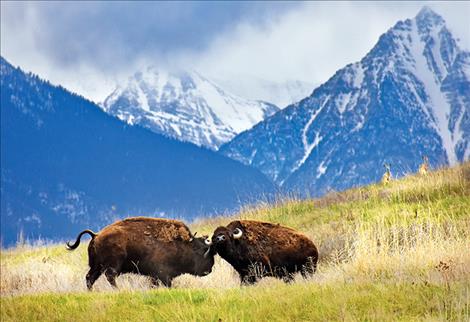Daines bill would return Bison Range to CSKT
Hey savvy news reader! Thanks for choosing local.
You are now reading
1 of 3 free articles.
MONTANA – A bill that would settle a longstanding water rights dispute between the Confederated Salish and Kootenai Tribes and state and federal governments would also return control of the National Bison Range to the tribes.
While the exact language of the bill has not yet been made public, a draft obtained by Montana Free Press includes a section that reverses a 111-year-old act of Congress that took the lands comprising the Bison Range from the tribes. The Bison Range is entirely within the borders of the Flathead Indian Reservation.
A spokeswoman for Montana Republican U.S. Sen. Steve Daines said Daines plans to introduce the legislation. Daines Communications Director Katie Schoettler confirmed that the bill Daines plans to introduce would restore tribal control of some 18,800 acres that are currently part of the National Wildlife Refuge System and managed by the U.S. Fish and Wildlife Service.
“This is part of the agreement and compromise reached in exchange for the tribe making significant concessions to water claims, including all in the Flathead [Valley]” Daines said in a statement to MTFP.
Daines last week announced his support for federal settlement framework legislation that would ratify the CSKT-Montana compact passed by the 2015 Montana Legislature and settle remaining disputes over federal mismanagement of the tribes’ water.
The deal also includes $1.9 billion to settle federal damage claims and to rehabilitate the deteriorating Flathead Indian Irrigation Project, which supplies irrigation to approximately 127,000 acres of agricultural land.
The tribes, in return, would relinquish the bulk of their off-reservation water right claims and be prohibited from selling water out of state.
“Restoring the Bison Range to federal trust ownership for the tribes is an elegant solution that would correct the historic injustice of the United States taking the Bison Range from the tribes’ treaty-reserved homeland without tribal consent,” CSKT Tribal Chairman Ron Trahan said in a statement provided to MTFP. “It would also save taxpayer dollars and allow the Tribes’ award-winning Natural Resources Department to manage the land and wildlife as part of the extensive network of tribal conservation lands that surround the Bison Range. It would mark a return to making things whole again.”
Daines and the tribes touted the fact that the legislation also protects public access to the Bison Range. Under current federal management, there’s no law that requires public access. Under the proposed bill, public access would be enshrined in statute.
Daines also says the legislation will save taxpayers $1 to $2 million per year in management costs, in addition to $400 million the settlement would save taxpayers over a previous proposal.
The $1.9 billion payment to the tribes to restore and improve water systems is $400 million less than a previous proposal sponsored by Montana’s Democratic senator, Jon Tester.
Tester, a longtime supporter of the CSKT compact, said in an interview Tuesday that he supports the compromise Daines reached with the tribes and that he intends to co-sponsor the bill once it is introduced. “I will do anything I need to do to get this thing across the finish line,” Tester said. “It has to pass. If you take a look at the compact, it impacts about two-thirds of the state of Montana. I don’t think the water users want to end up in court.”
John S. Adams is an award-winning investigative reporter who has covered Montana politics, government and people for more than a decade. Prior to founding the Montana Free Press Adams was the statehouse bureau chief for the Great Falls Tribune and a correspondent for USA Today.
















